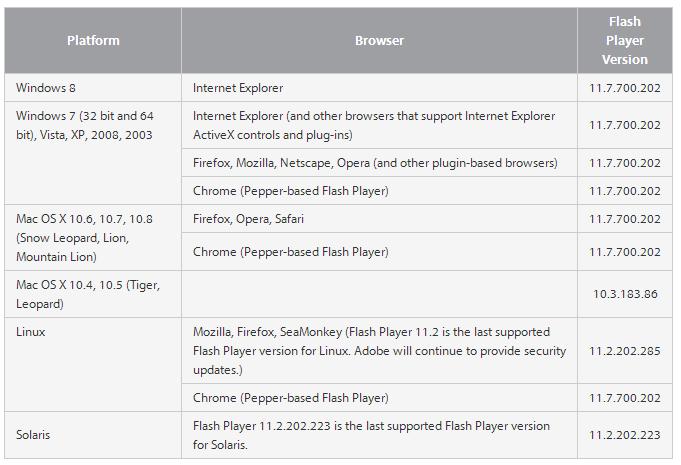Microsoft and Adobe have released updates for their products.
Microsoft announced the release of a series of updates aimed at fixing vulnerabilities in their products. The security fixes announced earlier in the pre-release (May 9) cover 33 unique vulnerabilities (2 fixes with Critical status and 8 with Important status). Detailed report (including corrections of corrections with CVE ID) can be found here . As in previous months, the updates are aimed at fixing Critical vulnerabilities in Internet Explorer and are of type Remote Code Execution . One of these updates closes the vulnerability in all versions of the browser, starting from version 6 and ending with the latest IE 10. Another critical fix is aimed at closing flaw in IE 8. 0day exploit for this vulnerabilityrecently used to organize an attack on US government agencies with the subsequent delivery of malicious code. To apply IE patches, a reboot is required.

One of the Critical updates ( MS13-037 ) fixes 10 vulnerabilities in Internet Explorer (versions 6-10). To exploit these vulnerabilities, the use-after-free technique is used when the browser code accesses an already deleted object in memory, which can lead to memory corruption, followed by the execution of arbitrary code in the context of the current user. These include: CVE-2013-0811, CVE-2013-1306, CVE-2013-1307, CVE-2013-1308, CVE-2013-1309, CVE-2013-1310, CVE-2013-1311, CVE-2013- 1312, CVE-2013-1313, CVE-2013-2551.
Other Critical Update (MS13-038 ) also resolves a vulnerability that is exploited by the use-after-free method, but only for IE8. We mentioned that an exploit for this vulnerability was used in attacks on US government agencies, so the vulnerability is is-being-exploited-in-the-wild .
Note that Microsoft on May 8 released a special tool, Fix It tool, which is designed to fix vulnerabilities in IE8.

Two Important updates are aimed at fixing vulnerabilities in kernel-mode drivers. MS13-039 regulates the fix for CVE-2013-1305 in the http.sys driver for Windows 8, Server 2012, RT and is of type Denial of Service. The vulnerability is present in the driver code, which incorrectly processes some HTTP headers. As a result, an attacker can cause an endless loop in the process of processing HTTP headers when they are delivered to the http.sys driver, which is a serious problem for both the server and the client.
The second Important update for kernel-mode drivers ( MS13-046 ) relates to components such as the DirectX driver (dxgkrnl.sys) and the Windows subsystem driver (win32k.sys). In the case of dxgkrnl.sys, we are talking about fixing the vulnerability CVE-2013-1332, which is of type Elevation of Privelegeand concerns the incorrect operation of the driver code with objects in memory. These vulnerabilities are present in all versions of the OS, starting with Windows XP and ending with Windows 8, Server 2012 and RT. In the case of win32k.sys, we are talking about the vulnerabilities CVE-2013-1333 and CVE-2013-1334, which are also of the type Elevation of Privelege .
In general, patches are focused on products such as the Microsoft the Windows , of Office ,. NET Framework , Windows Essentials, and Microsoft Lync .
We recommend that our users install updates as soon as possible and, if you have not already done so, enable automatic delivery of updates using Windows Update (this option is enabled by default).
Adobe has released updates for its following products: ColdFusion (hotfix), Adobe Flash Player , Adobe Reader, and Acrobat .
Updates for Adobe Flash Player fix a total of 13 vulnerabilities that could lead to the execution of arbitrary code.

We recommend that users use a check of the version of Flash Player used by your browser, for this you can use the official. Adobe source hereor here . Note that browsers such as Google Chrome and Internet Explorer 10 are automatically updated with the release of the new version of Flash Player. You can get Flash update information for your browser at this link .
Current versions of Flash Player for browsers:

Updates for Adobe Reader and Acrobat close 27 vulnerabilities, most of which can lead to the execution of arbitrary code when viewing a specially crafted PDF. These include: CVE-2013-2718, CVE-2013-2719, CVE-2013-2720, CVE-2013-2721, CVE-2013-2722, CVE-2013-2723, CVE-2013-2725, CVE-2013- 2726, CVE-2013-2731, CVE-2013-2732, CVE-2013-2734, CVE-2013-2735, CVE-2013-2736, CVE-2013-3337, CVE-2013-3338, CVE-2013-3339, CVE-2013-3340, CVE-2013-3341.

One of the updates addresses the use-after-free (CVE-2013-2550) vulnerability that could be used to bypass sandbox mode in Adobe Reader. Vulnerabilities leading to stack overflow (CVE-2013-2724) and memory buffer (CVE-2013-2730, CVE-2013-2733)
are also subject to correction. Software versions to be updated.

Adobe Reader and Acrobat users have an auto-update feature. To update manually, use this recommendation .
In the case of ColdFusion, hotfix aims to fix two vulnerabilities: CVE-2013-1389 and CVE-2013-3336.
Vulnerability CVE-2013-3336 allows unauthorized users to receive files from a remote server, in addition, it has the status of is-being-exploited-in-the-wild , i.e., this vulnerability is already exploited by cybercriminals.

be secure.

One of the Critical updates ( MS13-037 ) fixes 10 vulnerabilities in Internet Explorer (versions 6-10). To exploit these vulnerabilities, the use-after-free technique is used when the browser code accesses an already deleted object in memory, which can lead to memory corruption, followed by the execution of arbitrary code in the context of the current user. These include: CVE-2013-0811, CVE-2013-1306, CVE-2013-1307, CVE-2013-1308, CVE-2013-1309, CVE-2013-1310, CVE-2013-1311, CVE-2013- 1312, CVE-2013-1313, CVE-2013-2551.
Other Critical Update (MS13-038 ) also resolves a vulnerability that is exploited by the use-after-free method, but only for IE8. We mentioned that an exploit for this vulnerability was used in attacks on US government agencies, so the vulnerability is is-being-exploited-in-the-wild .
Note that Microsoft on May 8 released a special tool, Fix It tool, which is designed to fix vulnerabilities in IE8.

Two Important updates are aimed at fixing vulnerabilities in kernel-mode drivers. MS13-039 regulates the fix for CVE-2013-1305 in the http.sys driver for Windows 8, Server 2012, RT and is of type Denial of Service. The vulnerability is present in the driver code, which incorrectly processes some HTTP headers. As a result, an attacker can cause an endless loop in the process of processing HTTP headers when they are delivered to the http.sys driver, which is a serious problem for both the server and the client.
The second Important update for kernel-mode drivers ( MS13-046 ) relates to components such as the DirectX driver (dxgkrnl.sys) and the Windows subsystem driver (win32k.sys). In the case of dxgkrnl.sys, we are talking about fixing the vulnerability CVE-2013-1332, which is of type Elevation of Privelegeand concerns the incorrect operation of the driver code with objects in memory. These vulnerabilities are present in all versions of the OS, starting with Windows XP and ending with Windows 8, Server 2012 and RT. In the case of win32k.sys, we are talking about the vulnerabilities CVE-2013-1333 and CVE-2013-1334, which are also of the type Elevation of Privelege .
In general, patches are focused on products such as the Microsoft the Windows , of Office ,. NET Framework , Windows Essentials, and Microsoft Lync .
We recommend that our users install updates as soon as possible and, if you have not already done so, enable automatic delivery of updates using Windows Update (this option is enabled by default).
Adobe has released updates for its following products: ColdFusion (hotfix), Adobe Flash Player , Adobe Reader, and Acrobat .
Updates for Adobe Flash Player fix a total of 13 vulnerabilities that could lead to the execution of arbitrary code.

We recommend that users use a check of the version of Flash Player used by your browser, for this you can use the official. Adobe source hereor here . Note that browsers such as Google Chrome and Internet Explorer 10 are automatically updated with the release of the new version of Flash Player. You can get Flash update information for your browser at this link .
Current versions of Flash Player for browsers:

Updates for Adobe Reader and Acrobat close 27 vulnerabilities, most of which can lead to the execution of arbitrary code when viewing a specially crafted PDF. These include: CVE-2013-2718, CVE-2013-2719, CVE-2013-2720, CVE-2013-2721, CVE-2013-2722, CVE-2013-2723, CVE-2013-2725, CVE-2013- 2726, CVE-2013-2731, CVE-2013-2732, CVE-2013-2734, CVE-2013-2735, CVE-2013-2736, CVE-2013-3337, CVE-2013-3338, CVE-2013-3339, CVE-2013-3340, CVE-2013-3341.

One of the updates addresses the use-after-free (CVE-2013-2550) vulnerability that could be used to bypass sandbox mode in Adobe Reader. Vulnerabilities leading to stack overflow (CVE-2013-2724) and memory buffer (CVE-2013-2730, CVE-2013-2733)
are also subject to correction. Software versions to be updated.

Adobe Reader and Acrobat users have an auto-update feature. To update manually, use this recommendation .
In the case of ColdFusion, hotfix aims to fix two vulnerabilities: CVE-2013-1389 and CVE-2013-3336.
Vulnerability CVE-2013-3336 allows unauthorized users to receive files from a remote server, in addition, it has the status of is-being-exploited-in-the-wild , i.e., this vulnerability is already exploited by cybercriminals.

be secure.
